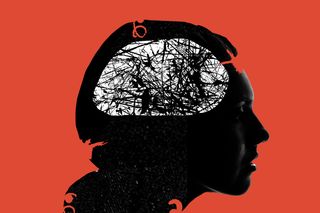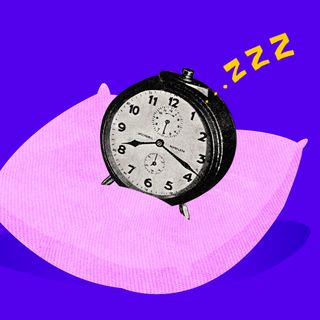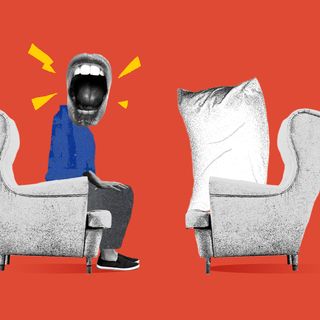
Can Mental Illnesses Make PMS Worse?
Research has consistently shown that individuals with a history of mental health disorders are more likely to experience severe PMS.

A few years ago, a male friend said, “Womanhood is fundamentally unfair. Take menstruation and pregnancy, for instance; why do they have to be so uncomfortable? For no good reason, every month, for a better part of your life, you have to go through this sh*t.” He was right, but he was only referring to menstrual cramps and the host of physically painful symptoms accompanying pregnancies. I had to remind him that bleak as it was, that’s not nearly where the discomfort — to put it mildly — ended.
There is no end to the memes and jokes about people being temperamental during “that time of the month.” That aspect of it gets acknowledged — and mocked — because it impacts the lives of people around the menstruating individual. Even so, the toll that the hormonal fluctuations responsible for the infamous mood swings take on the person experiencing them physiologically, is lost amid the laughter that follows the jokes that their expense. It doesn’t dilute the experience of pre-menstrual syndrome (PMS), though. That remains fresh as ever, resurfacing every month to wreak fresh havoc.
From irritability and mood swings to sleeplessness and appetite changes to anxiety and fatigue, PMS’ impact on people’s mental health is rather versatile. Unfortunately, for people with pre-existing mental health conditions, PMS can feel like… hell.
Research has consistently shown that individuals with a history of mental health disorders are more likely to experience severe PMS. There’s something called pre-menstrual exacerbation (PME), which actually denotes the worsening of one’s usual mental health issues during the time leading up to their periods.
Related on The Swaddle:
Lockdown Stress Is Disrupting Menstrual Cycles
Individuals living with bipolar disorder, for instance, experience a worsening of their usual symptoms right before their periods, even while being treated for the pre-existing disorder. People living with clinical depression, too, have been found to report more severe PMS symptoms — including suicidal thoughts — compared to women without a history of depression. Those with anxiety, too, often feel more jittery and witness a spike in their angst just before their periods begin.
In fact, increase in the severity of anxiety and depression in the time leading up to one’s period can cross over from the territory of PMS to that of PMDD, or pre-menstrual dysphoric disorder, whose symptoms are extreme enough to interfere with their personal and professional lives. Individuals with a personal history of depression, among other mood disorders, are actually considered more vulnerable to PMDD.
“My PMS was so severe that it had begun to take over my life, wreck relationships, ruin jobs [and] studying, and caused me so much emotional pain that I often found myself considering suicide. I would become housebound, with no social life or friends and fearful of ever making an appointment because I could never guarantee how I would be feeling,” Cat, 34, who has a diagnosis of depression, wrote of her experience navigating severe PMS, which later turned out to be PMDD, from the age of 13.
Let alone mental health illnesses, even neurodivergent individuals experience can experience severe PMS — as a result of heightened sensitivity to stimuli and increased emotional dysregulation — with reports indicating that up to 92% of autistic individuals and 46% of ADHD-people experiencing PMDD.
The reason why some people tend to be more sensitive to hormonal changes that occur during the menstrual cycle isn’t crystal clear, though. But experts have a number of theories.
Related on The Swaddle:
First Large‑Scale Study Investigates How Covid19 Vaccines Impact Periods
PMS is believed to be induced by changes in the levels of estrogen and progesterone — hormones that play a crucial role in regulating the menstrual cycle. Estrogen has a role to play in modulating the levels of serotonin — the feel-good chemical that regulates our mood. Now, to set the process of ovulation in motion, the estrogen in one’s body peaks . However, when one doesn’t get pregnant, it dips rather quickly — impacting the levels of serotonin, and therefore, impacting one’s mood right before they start their periods.
However, it’s not like individuals who experience PMS necessarily have abnormal levels of these hormones in their bodies; instead, experts note that they’re simply “more sensitive” to the effects of these hormones. They hypothesize that the experience of uncharacteristically severe PMS, or PMDD, could be an abnormal reaction to hormonal changes — particularly to dips in levels of serotonin — during one’s menstrual cycle, since the symptoms point to an inhibition in one’s ability to control mood, attention, sleep, and pain. In other words: some people may just be more sensitive than others to normal hormonal fluctuations.
“Some [people] with anxiety problems may experience a premenstrual exacerbation of their anxiety symptoms. Also, some of the factors that predict anxiety-related problems also predict PMS, suggesting a potential link between these two problems,” Yael Nillni, a psychologist from Boston, explains. “Researchers have speculated that rapid hormonal withdrawal might underlie those symptoms.”
Experts also note that a history of mental illnesses coupled with the experience of PMS can set off a vicious cycle. While dealing with PMS — whether or not worsened by an underlying mental illness — many individuals encounter “increases in psychological distress and irritability, and decreased self-esteem,” in addition to “increased interpersonal conflicts and reduced social engagement.” Contributing to stress and isolation thus, it can make them feel further anxious and depressed.
Devrupa Rakshit is an Associate Editor at The Swaddle. She is a lawyer by education, a poet by accident, a painter by shaukh, and autistic by birth. You can find her on Instagram @devruparakshit.
Related


How Much Sleep Do We Really Need?
